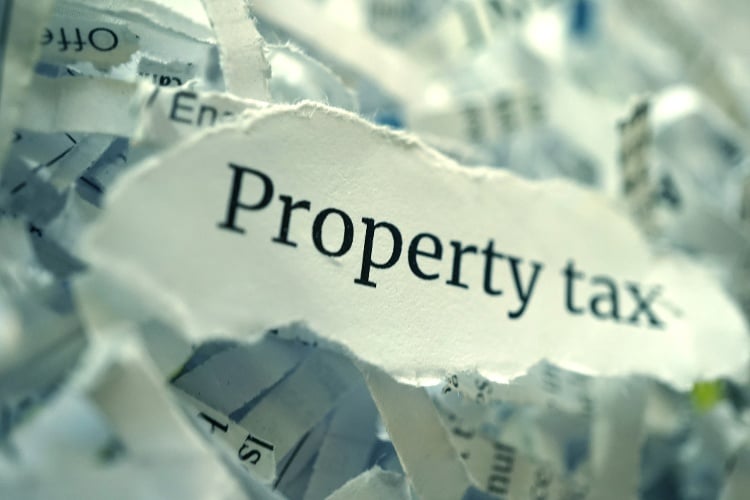Among all of the operating expenses that come with owning a rental home, property taxes are the one cost that real estate investors have little control over.
Depending on the amount, property taxes can be a minor issue or a major expense. It’s important to think about how property taxes might change during the time you own the property and the impact of rising taxes on your return on investment (“ROI”).
In this article, we’ll take a look at how property taxes are calculated, tax rates for each state, and ideas for keeping property taxes under control.
Property tax overview
Property tax is based on the assessed value of real estate.
Also known as an “ad valorem” tax, property taxes are normally levied by the county the property is located in and used to fund the operating budgets of school districts, police and fire departments, and local infrastructure projects such as water treatment plants and highway construction.
The local tax assessor will generally calculate a property’s market value every few years using a combination of the income, cost, and sales evaluation appraisal methods. In some counties, a change of ownership may also reset the assessed value of a property even if the scheduled assessment is not due for another year.
Then the assessor will multiply the market value by the assessment rate to determine the assessed property value. Finally, the assessor will multiply the assessed property value by the millage or mill rate for the region to determine the annual property tax amount.
The mill rate is based on the budgeting needs for each taxing entity in the county, such as cities and school districts. One mill is equal to 1/10th of one cent, which means that for every $100 of assessed property value one mill would equal $0.10 or $1,000 of assessed value would equal $1.00.
If the total assessed property value in a county is $1 billion and all of the taxing districts in the county require a combined total of $15 million in tax revenues to fund their budgets, unless the county has other revenue streams available, the mill levy used to determine the tax amount for each individual property would be 1.5% ($15 million / $1 billion).
Based on this example, if your property has an assessed value of $500,000 your property tax for the year would be $7,500 ($500,000 x 1.5%).
Property taxes by state
Now let’s take a look at the property taxes by state.
To create this chart, we used Zillow to determine the typical value of middle price tier single-family homes and the property tax rates listed by state from WalletHub to determine the average state tax rate and the amount of annual property taxes.
| State | Home Value | Avg State Tax Rate | Property Tax |
| Alabama | $227,873 | 0.39% | $888 |
| Alaska | $364,674 | 1.16% | $4,231 |
| Arizona | $430,658 | 0.56% | $2,412 |
| Arkansas | $207,627 | 0.59% | $1,225 |
| California | $773,239 | 0.71% | $5,489 |
| Colorado | $543,500 | 0.49% | $2,663 |
| Connecticut | $408,201 | 2.10% | $8,572 |
| Deleware | $387,158 | 0.55% | $2,129 |
| District of Columbia | $601,920 | 0.56% | $3,371 |
| Florida | $393,698 | 0.82% | $3,228 |
| Georgia | $328,526 | 0.83% | $2,726 |
| Hawaii | $855,259 | 0.27% | $2,309 |
| Idaho | $452,787 | 0.56% | $2,536 |
| Illinois | $265,991 | 2.11% | $5,609 |
| Indiana | $242,672 | 0.77% | $1,868 |
| Iowa | $220,188 | 1.49% | $3,280 |
| Kansas | $228,299 | 1.34% | $3,058 |
| Kentucky | $207,759 | 0.80% | $1,662 |
| Louisiana | $198,951 | 0.55% | $1,095 |
| Maine | $405,170 | 1.17% | $4,740 |
| Maryland | $420,854 | 1.02% | $4,291 |
| Massachusetts | $627,596 | 1.15% | $7,217 |
| Michigan | $247,638 | 1.35% | $3,344 |
| Minnesota | $334,240 | 1.05% | $3,509 |
| Mississippi | $179,894 | 0.76% | $1,367 |
| Missouri | $247,482 | 0.91% | $2,252 |
| Montana | $463,962 | 0.79% | $3,663 |
| Nebraska | $260,097 | 1.54% | $4,005 |
| Nevada | $441,637 | 0.50% | $2,208 |
| New Hampshire | $479,752 | 1.89% | $9,067 |
| New Jersey | $535,982 | 2.33% | $12,492 |
| New Mexico | $303,947 | 0.74% | $2,250 |
| New York | $480,516 | 1.64% | $7,874 |
| North Carolina | $329,341 | 0.73% | $2,404 |
| North Dakota | $262,706 | 0.99% | $2,600 |
| Ohio | $230,250 | 1.43% | $3,291 |
| Oklahoma | $205,646 | 0.85% | $1,748 |
| Oregon | $495,042 | 0.86% | $4,857 |
| Pennsylvania | $269,276 | 1.41% | $3,798 |
| Rhode Island | $470,378 | 1.39% | $6,537 |
| South Carolina | $296,987 | 0.53% | $1,574 |
| South Dakota | $307,799 | 1.14% | $3,507 |
| Tennessee | $320,181 | 0.58% | $1,857 |
| Texas | $301,011 | 1.63% | $4,905 |
| Utah | $517,550 | 0.55% | $3,195 |
| Vermont | $395,523 | 1.78% | $7,039 |
| Virginia | $392,434 | 0.76% | $2,982 |
| Washington | $591,095 | 0.88% | $5,201 |
| West Virginia | $167,571 | 0.55% | $922 |
| Wisconsin | $306,557 | 1.59% | $4,874 |
| Wyoming | $353,250 | 0.58% | $2,409 |
Homeowners in Hawaii and Alabama benefit from the lowest property tax rates, while residents in New Jersey and Illinois see the highest property tax rates.
Where to find your property tax
Property taxes vary from state to state and have a significant impact on the ROI a rental property generates.
While using back-of-the-napkin calculations like GRM and the 50% Rule to estimate property value and operating expenses, it’s important to always put together a pro forma statement using as close to actual numbers before investing in a home to rent.
You can find property tax assessments by visiting the local county assessor’s or appraiser’s website. Some county assessors also publish the anticipated change in property taxes for upcoming years, which makes creating an accurate return projection that much easier.
As you narrow down your search for a rental property investment, another good resource for estimating property taxes, operating expenses, and overall return is with the free rental property analyzer in this article.
How to lower your property taxes
While there’s no way to avoid them, there are a few things real estate investors can do to lower the property taxes paid on a rental property:
Review your property data
Make sure that the county has accurate information on your property. Lot size, construction date and materials, square footage, number of bedrooms and bathrooms, and improvements can all affect the assessed value used for property tax purposes.
Compare the data the county has on file to the appraisal done when you purchased the house, then immediately notify the county assessor’s office if there are any mistakes.
Improve with an eye on ROI
Before making any improvements, ask your contractor or contact the county tax department for an estimate on how much your property taxes will go up if you make an improvement such as building a backyard deck or enclosing the garage.
Then compare the increase in operating expenses to your anticipated rental increase from the improvement to make sure you’re getting a real return on your investment.
Keep curb appeal under control
If your house looks nicer than all of the other homes in the neighborhood that just might trigger an increase in assessed value and higher property taxes. As a real estate investor you naturally have pride of ownership, but don’t go overboard by trying to have better curb appeal than your next door neighbors do.
As long as your home is attractive to tenants, resist the urge to update the landscaping or repaint the outside of your house if it really doesn’t need it.
Look at the neighbors
When you receive the notice of assessment from the county tax collector, jump online and see what your neighbors are paying in property tax.
Just like you can run sales and rent comps, you can also run quick property comparables to make sure that the assessor is being fair and accurate by giving comparable homes the same assessed value for property tax purposes.
Appeal your tax assessment
If you feel your assessed value of the property is unjust, you can always appeal your property tax bill. Most counties send out the notice of assessed value a month or so before sending you the property tax bill, so that’s your window of opportunity to appeal your tax assessment.
An attorney, if you choose to hire one to represent you on the appeal, will generally charge a small fixed fee plus a percentage of the property tax reduction, and can also tell you if there’s a good chance you’ll win the property tax assessment appeal based on their previous experience.
Wrapping up
Property taxes are used by local and county governments to fund operating budgets for things like school districts, police and fire departments, and infrastructure projects such as water treatment or highway improvements. While all of these initiatives can help to increase property value, in some states property taxes can have a significant effect on how profitable a rental property is.
When you're researching potential investments, be sure to put together a pro forma using accurate income and expense numbers. If you already own a home in a state where property taxes are high, remember that there may be some things you can do to lower your property taxes and improve your cash flow.










